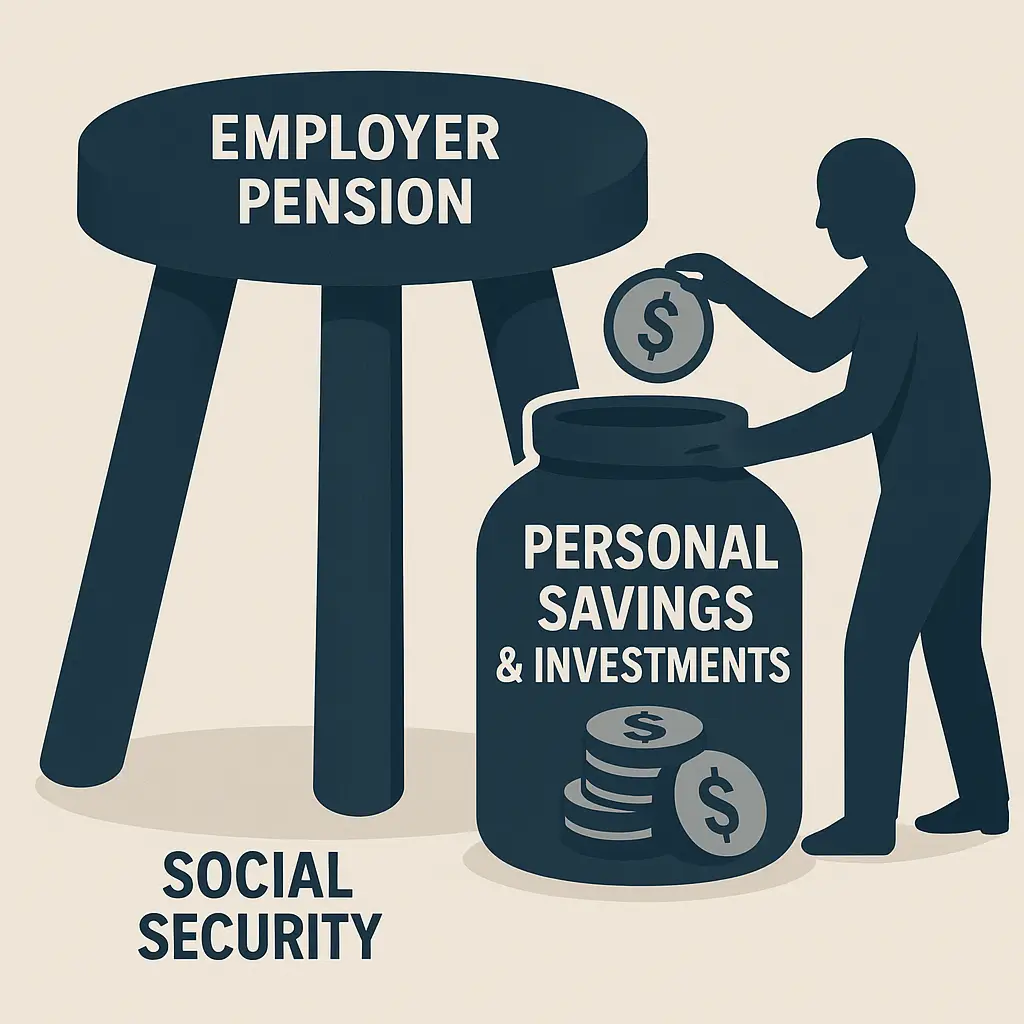Contents
Audio Podcast on Pension & Personal Savings: Your Retirement Shield
If you’re one of the fortunate workers who still has access to an employer-sponsored defined benefit pension plan, congratulations! These plans, which promise a specific monthly income in retirement, have become increasingly rare, especially in the private sector. Having a pension can feel like a significant safety net, leading some to wonder if they can rely solely on it and perhaps skip rigorous personal retirement planning. While a pension is a valuable asset, relying only on it for your retirement income is generally unwise and carries substantial risks.
Why Relying Solely on a Pension is Risky
- Pension May Not Cover All Expenses: Calculate your estimated pension payout. Will it realistically cover 100% of your projected retirement expenses, including rising healthcare costs and inflation? For many, especially those who didn’t spend an entire long career with one employer, the pension amount alone might fall short of providing a comfortable lifestyle.
- Lack of Inflation Protection (Often): Many private-sector pensions do not automatically adjust for inflation (Cost of Living Adjustments – COLAs). This means the purchasing power of your fixed pension payment will decrease significantly over a 20-30 year retirement. What seems adequate initially could feel meager later on. (Link to 1.1.5/4.17 when created)
- Employer/Plan Solvency Risk: While less common now due to stricter funding rules and Pension Benefit Guaranty Corporation (PBGC) insurance (up to certain limits), there’s still a small risk that a company could go bankrupt and be unable to meet its full pension obligations. PBGC guarantees provide a safety net, but may not cover the full promised benefit, especially for higher earners.
- Limited Flexibility and Control: Pension payments are typically fixed monthly amounts. You don’t have a lump sum you can access for emergencies, large purchases, or different spending patterns in retirement. Personal savings offer this crucial flexibility.
- Survivor Benefit Reductions: To provide income for a surviving spouse, you typically must choose a “joint and survivor” payout option, which reduces the monthly payment amount compared to a “single life” option. Relying solely on the pension might mean a significant income drop for the surviving spouse. (Link to 3.5 when created)
- No Upside Potential: Pension payments are generally fixed. Unlike personal investments, they don’t offer the potential for growth if markets perform well.
- Portability Issues: Pensions are tied to the specific employer. While you may be vested, the benefit doesn’t typically move with you like a 401(k) or IRA if you change jobs frequently.

Pensions as Part of a Diversified Plan
The best approach is to view your pension as one component of your overall retirement income strategy – a valuable part of the three-legged stool, but not the entire stool itself.
- Understand Your Pension: Get clear estimates of your projected benefit, understand payout options, survivor benefits, and any COLA provisions. (Link to 3.5 when created)
- Save Personally: Continue contributing diligently to your own 401(k)s, IRAs, or other accounts. This builds flexibility, provides inflation protection through investment growth, and gives you control. (Link to Silo 2 Pillar Page when created)
- Factor Pension into Needs: When calculating how much personal savings you need, you can subtract your reliable pension income from your total estimated expenses. This might mean your personal savings target is lower than someone without a pension, but it likely won’t be zero.
Conclusion
Having an employer pension is a significant advantage in retirement planning, providing a source of predictable income. However, due to factors like inflation erosion, lack of flexibility, potential payout reductions for survivors, and solvency risks (however small), relying solely on it is generally insufficient and risky. Treat your pension as a strong foundation or a key part of your plan, but continue to build robust personal retirement savings to ensure comprehensive security, flexibility, and inflation protection throughout your retirement years.

👋 Hi, I’m Jaiveer Hooda, the content creator behind Grow Your Money Smart!
I’m passionate about exploring the world of personal finance and sharing actionable insights to help you manage debt, plan for a secure retirement, and create passive income streams. 💡 My goal is to simplify complex financial topics and empower you to make smarter money decisions.
Let’s grow your wealth together, one smart move at a time! 💸